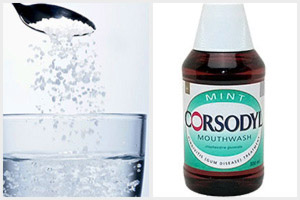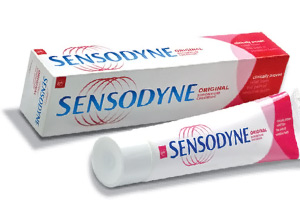If you suffer from sensitive teeth then this can be a highly frustrating and invasive problem. While this is by no means a serious issue and is nothing to worry about, it can nevertheless cause you a lot of discomfort and more importantly make it difficult to enjoy your meals. Sensitive teeth can be affected by a number of factors such as temperature and sugar content, and this means that many of the very best foods that you’re used to enjoying become off limits.
Of course if you are suffering from sensitive teeth though then it means that there is probably something wrong and it’s important that you address the problem as soon as possible.
Cause of Sensitive Teeth
 There are many different possible causes for sensitive teeth. Among the most common though is brushing too hard or too aggressively which can wear down the enamel and thereby cause the protective layer between the nerve and the food to become much thinner thereby meaning that your nerve can be more easily affected. This way then, if you eat something extremely hot, it might feel hot through your thin layer of enamel and thus excite the nerve in the tooth resulting in pain. Similarly if you eat something sugary, which can also excite our nerves, then this can similarly hurt through the thinner layer of enamel.
There are many different possible causes for sensitive teeth. Among the most common though is brushing too hard or too aggressively which can wear down the enamel and thereby cause the protective layer between the nerve and the food to become much thinner thereby meaning that your nerve can be more easily affected. This way then, if you eat something extremely hot, it might feel hot through your thin layer of enamel and thus excite the nerve in the tooth resulting in pain. Similarly if you eat something sugary, which can also excite our nerves, then this can similarly hurt through the thinner layer of enamel.
As such then, the first thing to do in order to avoid sensitive teeth is to ensure that you ensure that you brush gently. Think of the term sensitive teeth literally – your teeth are delicate so treat them thusly. Brushing thoroughly and brushing hard are not the same so be sure that you still brush every bit of your teeth but be careful to do so without forcefully pushing your brush against your tooth.
Likewise you may also experience sensitive teeth as a result to damage to your gums as this can expose the roots. Again this might be a result of brushing too hard, so if you are looking long in the tooth around the area, try to make sure that you brush gently and have a soft brush.
Meanwhile sensitive teeth can be a result of more serious problems such as an abscess or a chipped tooth which might completely reveal the sensitive nerve and root under your enamel to be hurt by temperature and sugar. You may also find that the reason your gums have receded or that your tooth has become sensitive is not that you have brushed too hard, but rather that you have an infection that has caused tissue damage. This can occur as all the bacteria in your mouth enters an open wound in your mouth and that will then cause the deterioration of tissue until you get the infection seen to.
How to Treat Sensitive Teeth
 If you have very sensitive teeth then the most important thing to do is to see a dentist in case your problem is due to an abscess or other issue that can be seen to and improved. Speak with your dentist and they might recommend a range of treatments such as a side filling to cover up more of the side of your tooth and protect the nerves, or such as a crown to help cover the thinned enamel on top.
If you have very sensitive teeth then the most important thing to do is to see a dentist in case your problem is due to an abscess or other issue that can be seen to and improved. Speak with your dentist and they might recommend a range of treatments such as a side filling to cover up more of the side of your tooth and protect the nerves, or such as a crown to help cover the thinned enamel on top.
If you have a gum infection then you will first need to stop the infection. A dentist will normally help you to accomplish this by prescribing an antibiotic which will work to fend off the infection and help your mouth recover. You can also help to treat an infection on your own, and the best way to do this is to use a saline solution (a teaspoon of salt in a glass of water) and to use that to swish around the inside of your mouth. As salt is an antibacterial agent this will help to disinfect the area. Using a mouthwash can also help such as Corsodyl.
Some wear and tear of the enamel is normal as you age and of course our teeth get a lot of battering throughout their lifetime. If you are struggling with sensitive teeth but you don’t want to go through a procedure such as a side filling, then you might find that it helps to use a sensitive toothpaste such as Sensodyne. Now these aren’t the most effective toothpastes in the world, so don’t use this to replace your usual product. Rather clean your teeth, and then just rub a little Sensodyne into the painful area using the tip of your finger. This works by clogging the dental tubules to protect the nerves in your teeth, but it may take a while before you notice the benefit.



